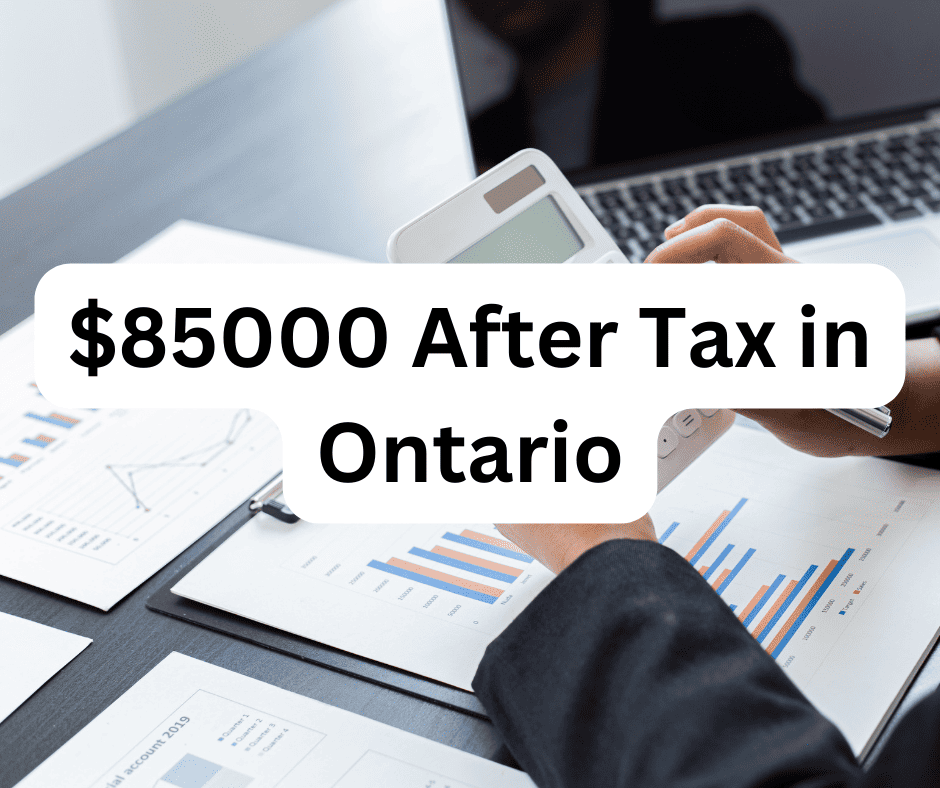Tax Rates and Take Home Pay on $85,000 in Ontario
An annual salary of $85,000 in Ontario would have the following key tax rates and take home pay:
- Total Income: $85,000
- Federal Tax: $11,436
- Provincial Tax: $5,685
- CPP Contributions: $3,754
- EI Premiums: $1,002
- Total Deductions: $21,878
- Net Take Home Pay: $63,122
This results in an average tax rate of 20.14% and a marginal tax rate of 29.65%. The net monthly take home pay is $5,260.
Ontario Tax Rates
Ontario has a progressive tax system with rates ranging from 5.05% to 13.16%:
- 5.05% on the first $49,231
- 9.15% on $49,231 to $98,462
- 11.16% on $98,463 to $150,000
- 12.16% on $150,000 to $220,000
- 13.16% over $220,000
An income of $85,000 falls into the 29.65% marginal tax bracket. This means every additional dollar earned above $85,000 would be taxed at 29.65%.
Deductions
The major deductions that reduce take home pay on $85,000 of income are:
- Federal tax: $11,436
- Provincial tax: $5,685
- Canada Pension Plan (CPP): $3,754
- Employment Insurance (EI) premiums: $1,002
CPP and EI are mandatory payroll deductions that provide retirement, disability, survivor and parental benefits.
Comparison to Other Provinces
Ontario has higher personal income taxes compared to western provinces like Alberta and B.C. but lower than eastern provinces.
For example, on $85,000 of income:
- Alberta would have $4,000 more net take home pay
- B.C. would have $1,000 more net take home pay
- Quebec and the Maritimes would have $2,000 to $5,000 less take home pay.
So Ontario ranks in the middle among provinces for income taxes on a salary of $85,000.
Is $85,000 a Good Salary in Ontario?
Yes, $85,000 represents a well above average salary in Ontario. Some key comparisons:
- The median household income in Ontario is $76,000. So $85,000 exceeds the household median.
- The average individual income in Ontario is around $55,000. So $85,000 is over 50% higher.
- $85,000 puts someone in the top 30% of income earners in Ontario.
In high cost areas like Toronto or Ottawa, $85,000 would represent a moderate middle class income. In lower cost areas, it would afford an upper middle class lifestyle.
Overall, $85,000 goes a long way across most of Ontario, allowing someone to live comfortably, though not lavishly.
Spending Power and Lifestyle
After taxes and deductions, take home pay on $85,000 works out to $63,122 annually or $5,260 monthly. How far does this get you in terms of lifestyle?
Housing
- In Toronto or Ottawa, expect a decent 1 bedroom apartment or rental townhouse.
- In other cities like London, Windsor or Thunder Bay, $85,000 income can afford a nice 2-3 bedroom house.
Transportation
- Allows for a recent model used car or modest new car.
- Enough for a car loan or lease payment, gas, insurance, maintenance.
Entertainment/Vacation
- Can afford nice restaurants, concerts, sports events several times a month.
- Support an annual vacation within Canada or to a sunny destination.
Savings and Debt Reduction
- Allows for paying down student loans or other debts within 5-10 years.
- Enough left each month to steadily build retirement and other savings.
So $85,000 provides a comfortable middle class lifestyle with some nice extras in most of Ontario. Not an extravagant high-flying lifestyle but far from struggling.
Financial Planning Tips
Here are some financial planning best practices on an $85,000 household income:
Budgeting
- Track your spending to have a clear idea where the money goes. Apps like Mint can automate this.
- Make a budget that aligns with your values and priorities. Allow for necessities, some discretionary spending, savings goals, and debt reduction.
Managing Debt and Credit
- Pay down high interest debts like credit cards first.
- Consolidate multiple debts into a lower rate product like a line of credit.
- Establish/maintain good credit history to qualify for low rate financing to make major purchases more affordable.
Savings and Investing
- Contribute enough to RRSPs to maximize any employer matching.
- Open and regularly contribute to Tax-Free Savings Accounts.
- Develop a financial plan to build long term wealth. A financial advisor can help with this.
Insurance/Risk Management
- Review insurance coverage for life, disability, critical illness, and property. Update if needed to protect income and assets against unexpected losses.
Accounting and Tax Planning
- Use an accountant to maximize income tax deductions and organize finances.
- Carefully plan the timing of major purchases like a house to maximize tax breaks.
Following these tips will help those earning $85,000 to effectively manage their household finances.
Conclusion
In summary, $85,000 represents an above average salary that affords a comfortable middle class lifestyle across Ontario. Take home pay after taxes is around $63,000. This is enough for nice housing, transportation, entertainment, modest travel, and steady savings and debt reduction. Following sound budgeting and financial planning principles allows someone earning $85,000 to achieve most financial goals and live well.

